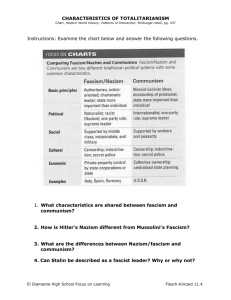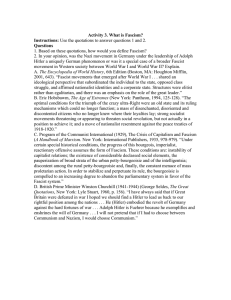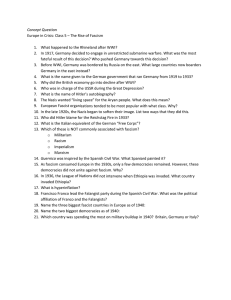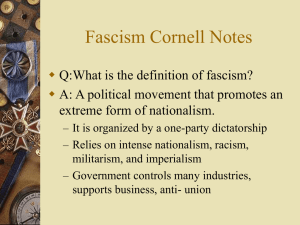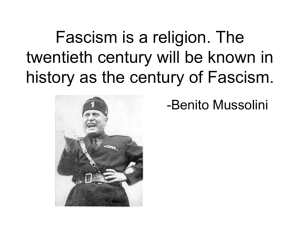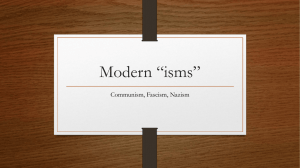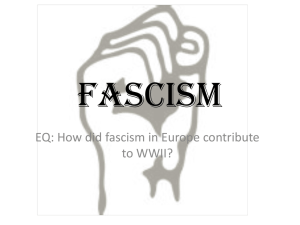What is Fascism?
advertisement
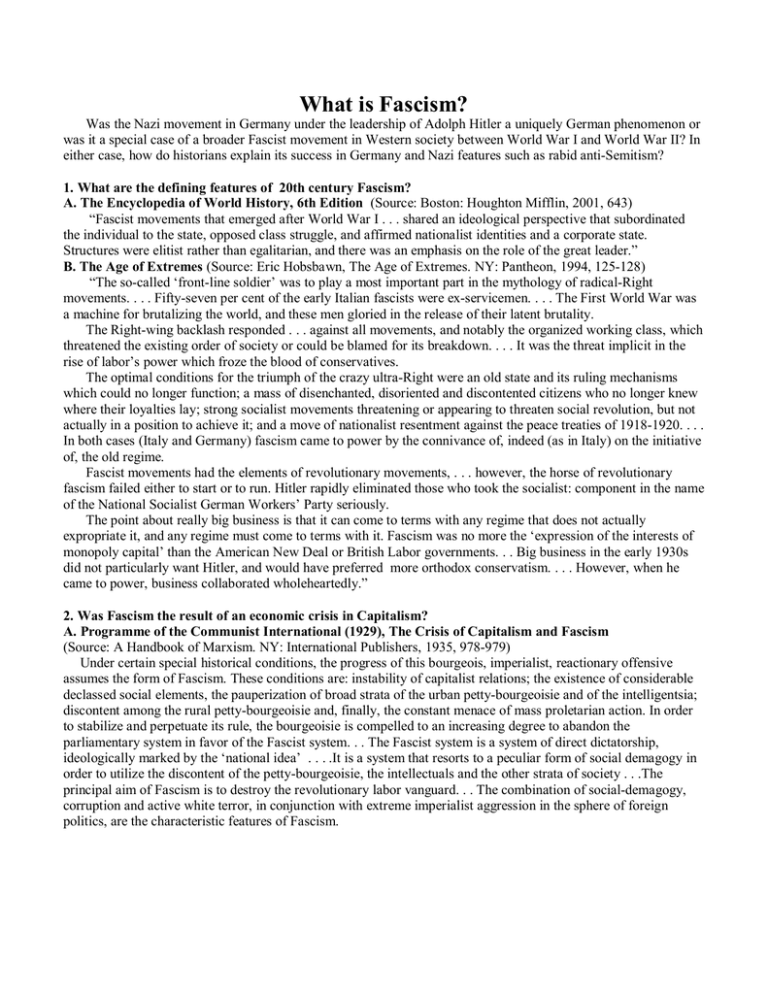
What is Fascism? Was the Nazi movement in Germany under the leadership of Adolph Hitler a uniquely German phenomenon or was it a special case of a broader Fascist movement in Western society between World War I and World War II? In either case, how do historians explain its success in Germany and Nazi features such as rabid anti-Semitism? 1. What are the defining features of 20th century Fascism? A. The Encyclopedia of World History, 6th Edition (Source: Boston: Houghton Mifflin, 2001, 643) “Fascist movements that emerged after World War I . . . shared an ideological perspective that subordinated the individual to the state, opposed class struggle, and affirmed nationalist identities and a corporate state. Structures were elitist rather than egalitarian, and there was an emphasis on the role of the great leader.” B. The Age of Extremes (Source: Eric Hobsbawn, The Age of Extremes. NY: Pantheon, 1994, 125-128) “The so-called ‘front-line soldier’ was to play a most important part in the mythology of radical-Right movements. . . . Fifty-seven per cent of the early Italian fascists were ex-servicemen. . . . The First World War was a machine for brutalizing the world, and these men gloried in the release of their latent brutality. The Right-wing backlash responded . . . against all movements, and notably the organized working class, which threatened the existing order of society or could be blamed for its breakdown. . . . It was the threat implicit in the rise of labor’s power which froze the blood of conservatives. The optimal conditions for the triumph of the crazy ultra-Right were an old state and its ruling mechanisms which could no longer function; a mass of disenchanted, disoriented and discontented citizens who no longer knew where their loyalties lay; strong socialist movements threatening or appearing to threaten social revolution, but not actually in a position to achieve it; and a move of nationalist resentment against the peace treaties of 1918-1920. . . . In both cases (Italy and Germany) fascism came to power by the connivance of, indeed (as in Italy) on the initiative of, the old regime. Fascist movements had the elements of revolutionary movements, . . . however, the horse of revolutionary fascism failed either to start or to run. Hitler rapidly eliminated those who took the socialist: component in the name of the National Socialist German Workers’ Party seriously. The point about really big business is that it can come to terms with any regime that does not actually expropriate it, and any regime must come to terms with it. Fascism was no more the ‘expression of the interests of monopoly capital’ than the American New Deal or British Labor governments. . . Big business in the early 1930s did not particularly want Hitler, and would have preferred more orthodox conservatism. . . . However, when he came to power, business collaborated wholeheartedly.” 2. Was Fascism the result of an economic crisis in Capitalism? A. Programme of the Communist International (1929), The Crisis of Capitalism and Fascism (Source: A Handbook of Marxism. NY: International Publishers, 1935, 978-979) Under certain special historical conditions, the progress of this bourgeois, imperialist, reactionary offensive assumes the form of Fascism. These conditions are: instability of capitalist relations; the existence of considerable declassed social elements, the pauperization of broad strata of the urban petty-bourgeoisie and of the intelligentsia; discontent among the rural petty-bourgeoisie and, finally, the constant menace of mass proletarian action. In order to stabilize and perpetuate its rule, the bourgeoisie is compelled to an increasing degree to abandon the parliamentary system in favor of the Fascist system. . . The Fascist system is a system of direct dictatorship, ideologically marked by the ‘national idea’ . . . .It is a system that resorts to a peculiar form of social demagogy in order to utilize the discontent of the petty-bourgeoisie, the intellectuals and the other strata of society . . .The principal aim of Fascism is to destroy the revolutionary labor vanguard. . . The combination of social-demagogy, corruption and active white terror, in conjunction with extreme imperialist aggression in the sphere of foreign politics, are the characteristic features of Fascism. B. Georgi Dimitrov, Seventh World Congress of the Communist International (1935) With the development of the very deep economic crisis, with the general crisis of capitalism becoming sharply accentuated and the mass of working people becoming revolutionized, fascism has embarked upon a wide offensive. The ruling bourgeoisie more and more seeks salvation in fascism, with the object of taking exceptional predatory measures against the working people, preparing for an imperialist war of plunder, attacking the Soviet Union, enslaving and partitioning China, and by all these means preventing revolution. Fascism in power was correctly described by . . . the Communist International as the open terrorist dictatorship of the most reactionary, most chauvinistic and most imperialist elements of finance capital. The most reactionary variety of fascism is the German type of fascism. . . . German fascism is not only bourgeois nationalism, it is fiendish chauvinism. It is a government system of political gangsterism, a system of provocation and torture practiced upon the working class and the revolutionary elements of the peasantry, the petty bourgeoisie and the intelligentsia. Fascism is the power of finance capital itself. . . . In foreign policy, fascism is jingoism in its most brutal form, fomenting bestial hatred of other nations. . . .The true character of fascism, must be particularly stressed because in a number of countries, under cover of social demagogy, fascism has managed to gain the following of the mass of the petty bourgeoisie that has been dislocated by the crisis, and even of certain sections of the most backward strata of the proletariat. 2. Was it only a German or Italian phenomenon? British Prime Minister Winston Churchill (1941-1944) “I have always said that if Great Britain were defeated in war I hoped we should find a Hitler to lead us back to our rightful position among the nations. . . . He (Hitler) embodied the revolt of Germany against the hard fortunes of war . . . Adolf Hitler is Fuehrer because he exemplifies and enshrines the will of Germany. . . I will not pretend that if I had to choose between Communism and Nazism, I would choose Communism.” United States Army World War II Textbook Defines Fascism Fascism is a political, social and economic form of society wherein by virtue of a merger which has been accomplished between certain powerful financial interests and a military machine, the entire nation is under the dictatorship of this oligarchy. Individuality and freedom are suppressed "in the interest of the state" which happens to be none other than the dictating oligarchy. Since so radical a change in a form of government is not very easily accomplished, the transition to Fascism is, at first, made easier by demagogic political agitation of the kind which is described as "We are all things to all men". To gain the backing of powerful industrialists … a form of society is offered which will protect their objective; disunity is created by playing political groups against each other, religious groups against each other. A confused and disunited people can offer no effective resistance to the seizure of power by this newly-merged oligarchy. Fascism is not the easiest thing to identify and analyze; nor, once in power, is it easy to destroy. Points to stress are: (1) Fascism is more apt to come to power in time of economic crisis; (2) Fascism inevitably leads to war; (3) it can come in any country; (4) we can best combat it by making our democracy work. Fascism is government by the few and for the few. The objective is seizure and control of the economic, political, social and cultural life of the state. The United States also has its native Fascists who say that they are "100 percent American"… At various times in our history, we have had sorry instances of mob sadism, lynchings, vigilantism, terror, and suppression of civil liberties. We have had our hooded gangs, Black Legions, Silver Shirts, and racial and religious bigots. All of them, in the name of Americanism, have used undemocratic methods and doctrines which experience has shown can be properly identified as "fascist". An American Fascist seeking power would not proclaim that he is a Fascist. Fascism always camouflages its plans and purposes. Any fascist attempt made to gain power in America would not use the exact Hitler pattern. It would work under the guise of "super-patriotism" and "super-Americanism". Fascist leaders are neither stupid nor naïve. They know that they must hand out a line that "sells". Huey Long is said to have remarked that if Fascism came to America it would be on a program of "Americanism". What is true of America is true of the world. The germ of Fascism cannot be quarantined in a Munich Brown House or a balcony in Rome. If we want to make certain that Fascism does not come to America, we must make certain that it does not thrive anywhere in the world.
